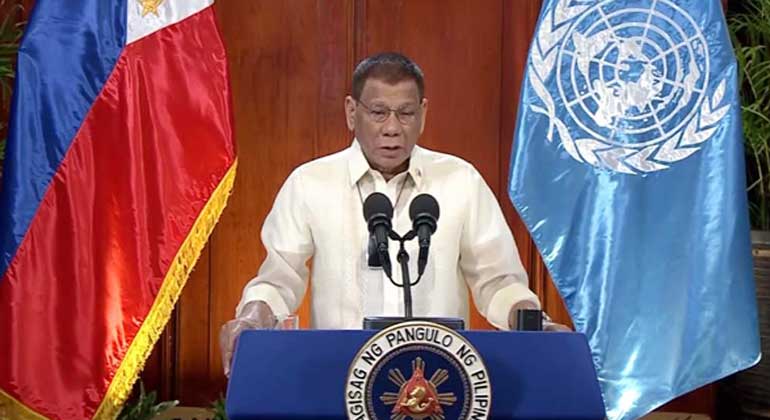
By Norman P. Aquino, Special Reports Editor
and Gillian M. Cortez, Reporter
PRESIDENT Rodrigo R. Duterte gave his most forceful defense of a 2016 United Nations (UN) ruling favoring the Philippines in a sea dispute with China, in a move that could signal the end of friendly ties with its neighbor, analysts said.
In a speech before the UN General Assembly on Wednesday Manila time — his first since coming to power four years ago — the tough-talking Philippine leader said the arbitral award was now “part of international law, beyond compromise and beyond the reach of passing governments to dilute, diminish or abandon.”
“We firmly reject attempts to undermine it,” Mr. Duterte said of the arbitration ruling that rejected China’s claim to more than 80% of the South China Sea, without naming China. His successor, Benigno SC. Aquino III, started the lawsuit.
He spoke before a virtual roster of world leaders that included US President Donald Trump and Chinese President Xi Jinping.
Mr. Duterte thanked other countries that supported the decision. “We welcome the increasing number of states that have come in support of the award and what it stands for — the triumph of reason over rashness, of law over disorder, of amity over ambition. This — as it should — is the majesty of the law.”
Mr. Duterte had sought closer trade and investment ties with China since he came to power in 2016, including potential joint explorations for oil and gas in the South China Sea.
“President Duterte’s repeated direct references to the July 2016 arbitral tribunal ruling will be very welcome in the Philippine government, Washington DC, the capitals of the other Southeast Asian claimant states in the South China Sea, Tokyo, Canberra and New Delhi,” said Malcolm Cook, ISEAS-Yusof Ishak Institute’s senior visiting fellow in Sydney. “They will be most unwelcome in Beijing.”
Mr. Duterte’s change of tone on the July 2016 ruling and his decision to defer Philippine withdrawal from a visiting forces agreement with the US suggest that he has been listening more to his Defense and Foreign Affairs chiefs, Mr. Cook said in an e-mail.
“China’s continued aggression in the West Philippine Sea and the lack of follow-through on the billions of dollars of promised Chinese economic assistance and investment have certainly not helped China’s image in the Philippines and the Duterte administration,” he added.
Canceling rather than simply suspending Philippine withdrawal from the military pact on the deployment of troops for war games would further cement this shift in the Duterte government’s security policy and approach to the South China Sea, he said.
The Department of Foreign Affairs in July said the UN ruling was nonnegotiable.
‘360-DEGREE TURN’
The tribunal ruled that China’s claim of historic rights to resources within the sea falling within the ‘nine-dash line’ was illegal.
The court said the Philippines could declare certain areas of the sea as part of its exclusive economic zone because these areas do not overlap with any entitlements claimed by China.
Certain Chinese actions within the Philippines’ exclusive zone violated its sovereign rights and were unlawful, the court said. It added that China’s island-building activities in the disputed waterway had caused severe environmental harm in violation of international conventions.
Mr. Duterte’s 360-degree turn “is a big victory for international law and Philippine sovereignty against his own defeatist policy on China,” Etta Rosales, a human rights activist and former congresswoman, said in an e-mailed statement.
“It is solid proof that the international community’s pressure for Mr. Duterte to submit to and recognize International law is working,” she added.
Mr. Duterte should strive to get the support of more countries, former Foreign Affairs Secretary Albert del Rosario said.
“The next step is for our President and his administration to put in reality the invocation of the arbitral award,” he told the ABS-CBN News Channel. “Our government should work earnestly to get the support of more countries so that the arbitral award will be raised more emphatically next year at the UN General Assembly.”
Mr. Duterte’s UN speech was “heartening,” former Supreme Court Justice Antonio Carpio said in a separate statement.
“I fervently hope that this is the policy that the Duterte administration will implement across all levels — in the protection of our exclusive economic zone in the West Philippine Sea, in the negotiations for the Code of Conduct, and in gathering the support of the international community for the enforcement of the arbitral award,” he said.
Mr. Carpio, Mr. Del Rosario and former Ombudsman Conchita Carpio Morales earlier sued Mr. Xi before the International Criminal Court over his country’s destructive activities in the South China Sea.
Foreign Affairs Secretary Teodoro Locsin, Jr. last week refused to raise the arbitral award before the UN, saying it was “not right” to raise the matter before the body “where numbers talk.”
“Imagine if I had brought the matter up in the UN General Assembly where numbers talk and not right as suggested by idiots,” he said on Twitter.
“Mr. Duterte’s speech signals a change in his foreign policy,” Renato C. de Castro, an International Studies professor from De La Salle University, said by telephone.” That will become the basis now to challenge China’s expansive maritime claim.”
It remains to be seen whether the President would follow through on his rhetoric, Robin Michael Garcia, chief executive officer at polling firm WR Numero research, said by telephone.
“We’ve had numerous diplomatic protests since 2016, but these were never followed up by actual policies,” he said.
Still, Mr. Duterte’s tough stance now “gives other countries hope that the Philippines might be at the forefront again in the South China Sea dispute,” he said. “It remains to be seen whether actual coalitions will be formed.”
Mr. Cook said Mr. Duterte had been the main source of instability in Philippine-US relations since he came to power. “This change of presidential rhetoric, if sustained, will reduce these problems and place Philippine-US relations after the upcoming US presidential election.”
